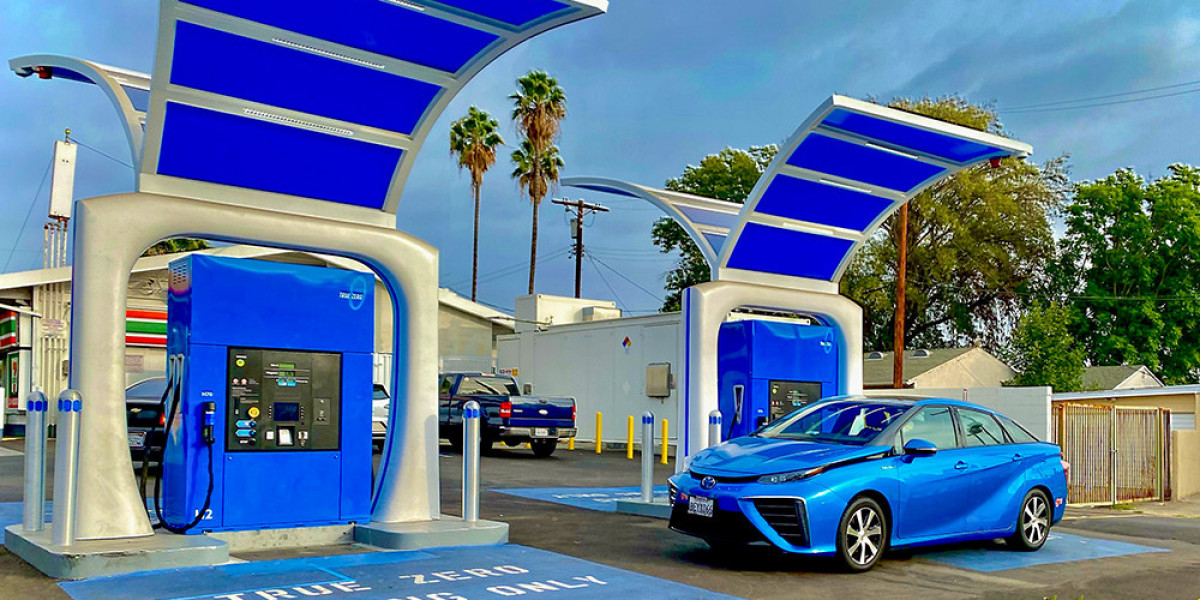Hydrogen Fueling Station Market: Powering the Green Future
In recent years, as the world grapples with the pressing need to combat climate change and reduce greenhouse gas emissions, the spotlight has increasingly turned towards alternative energy sources. One such promising solution is hydrogen fuel, which presents an eco-friendly and sustainable way to power vehicles and industries.
As the demand for clean energy rises, the hydrogen fueling station market has emerged as a vital component of the green energy infrastructure. In this article, we will explore the growth, significance, challenges, and future prospects of the hydrogen fueling station market.
1. What is a Hydrogen Fueling Station?
A hydrogen fueling station, also known as a hydrogen refueling station, is a facility that dispenses hydrogen gas to fuel cell vehicles and other hydrogen-powered machinery. These stations play a crucial role in supporting the adoption of hydrogen fuel cell technology, which converts hydrogen gas into electricity to power vehicles, emitting only water vapor as a byproduct.
2. The Growing Importance of Hydrogen Fueling Stations
The transition from conventional fossil fuels to renewable energy sources has become a global priority. Hydrogen, as an energy carrier, is garnering attention due to its clean and efficient characteristics. Unlike traditional fossil fuels, hydrogen does not emit harmful pollutants or greenhouse gases when used as an energy source, making it a viable solution for mitigating climate change.
3. Factors Driving the Hydrogen Fueling Station Market
a. Government Initiatives and Incentives
Governments worldwide are actively promoting the adoption of hydrogen fuel cells and investing in the establishment of hydrogen fueling infrastructure. Incentives, subsidies, and tax benefits are being offered to encourage private entities and investors to participate in the development of hydrogen fueling stations.
b. Advancements in Fuel Cell Technology
Continuous advancements in fuel cell technology have significantly improved the efficiency and reliability of hydrogen fuel cells. As fuel cell vehicles become more viable and cost-effective, the demand for hydrogen fueling stations is projected to rise.
c. The Rise of Hydrogen-Powered Vehicles
Major automakers are increasingly investing in hydrogen-powered vehicle development. The expansion of fuel cell vehicle fleets necessitates the availability of a robust hydrogen fueling infrastructure to support their growth.
4. Challenges Hindering Market Growth
Despite the potential and promise of hydrogen fueling stations, several challenges are impeding their rapid expansion:
a. High Initial Infrastructure Costs
The establishment of hydrogen fueling stations requires substantial upfront investment, including the costs of production, storage, and dispensing equipment. The high initial infrastructure costs can deter potential investors and stakeholders.
b. Limited Hydrogen Production and Distribution
Hydrogen production is predominantly reliant on fossil fuels, which limits its true potential as a clean energy source. Developing efficient and sustainable methods for hydrogen production and distribution is a pressing challenge.
c. Competing Infrastructure Technologies
The market faces competition from other alternative fueling technologies, such as electric vehicle charging stations. Convincing stakeholders to invest in hydrogen fueling stations over other options requires highlighting its unique advantages and long-term benefits.
5. Future Outlook for the Hydrogen Fueling Station Market
The future of the hydrogen fueling station market looks promising, with several developments on the horizon:
a. Green Hydrogen Production
Efforts are underway to produce "green hydrogen" using renewable energy sources like solar, wind, and hydropower. Green hydrogen eliminates the carbon footprint associated with conventional hydrogen production, making it a game-changer for the industry.
b. Public-Private Partnerships
Collaborations between governments, private companies, and research institutions are expected to accelerate the development of hydrogen infrastructure. Public-private partnerships can help share the costs and resources needed for widespread deployment.
c. Technological Advancements
Advancements in hydrogen storage, transportation, and distribution technologies will make hydrogen fueling stations more efficient and cost-effective.
Conclusion
The hydrogen fueling station market size is poised to play a significant role in the global transition to clean and sustainable energy systems. With growing support from governments, advancements in technology, and increasing interest from major industries, hydrogen fueling stations are set to be a cornerstone of the green future. Overcoming challenges and capitalizing on opportunities will be crucial to unlocking the full potential of hydrogen as a clean energy solution, driving us towards a greener and more sustainable tomorrow.
Related Reports:








